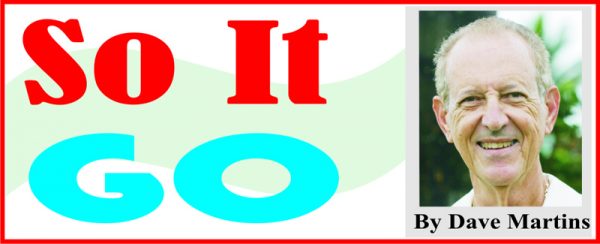
Beyond that, as someone involved with the deliberate creation of Caribbean music going back now some 60 years, it is interesting that while the dialect is there in my songs, it comes largely as interjection or emphasis. Indeed, aside from Jamaica, dialect in Caribbean music generally is mostly in the form of folk music – Shetira Gal and Itanami, in Guyana – and not as a rule in the popular music of the day. My minimal use of a specific dialect owes to my decision to write pan-Caribbean music, hence the name Tradewinds, so that using all the various dialects would have been okay for some but confusing for others. The one exception is when I wrote two songs using French patois words (somewhat clumsily, as I don’t speak patois) but those songs were released only for the St. Lucia/Dominica market; they would be unintelligible elsewhere.
For me, however, in performance, my own dialect is largely in play in my exchanges with the audience and their reaction frequently demonstrates the value of that tool to making a point effectively. Overall, my contention is that while persons who denigrate the dialect make the case it is evidence of our “ignorance,” it is actually evidence of information seriously lacking in those making such charges. I remember vividly being in a linguistics class in Ryerson University, in Toronto, where the Professor dealt with the subject of Old English and he referred to the various constructions closing off with a lexicon of words commonly used in that form. Going through the list, there was the word “hoist” and I was stunned to see that in Old English it was pronounced “hise.” I immediately recognised that was the pronunciation in Guyana, something we had obviously picked up from the early colonial masters. The examples are rife. In Jamaica, the dropping of the “h” at the front of a word resulting in “-ouse” and “-im,” for example, is a copying of the Cockney pronunciation of the colonial rulers. In other words, it’s a Jamaican copycat, not a creator. Similarly, in Barbados, the dropping of the “t” at the end of a word, so familiar in the speech of Bajans, particularly in the countryside, is straight out of Glasgow. I didn’t make the connection originally, but living in Toronto and married to my first wife, Dorothy, born in Scotland but raised in Canada, I heard that dropping of the final “t” in the conversations of various Scots living there. It hit me like a shot, how that similar practice had been picked up by the Bajans, not from stupidity, as some would say, but simply from copying the early Scottish settlers in their island.
Because of the variety of colonisers (English, French, Dutch, Spanish) in the Caribbean we have these diverse influences ending up in our dialects along with the ones that came when Africans, Indians, Chinese, etc., were brought in to work the plantations, so that in Guyana, we have a host of Dutch words in our dialect and the names of villages, as we have African words and many Indian words in our repartee as a matter of course, as well as French names of villages stemming from the time when the French were ruling here.
Similarly, it is striking to notice that in the Cayman Islands, settled by the British, the population generally follows the Germanic trait of pronouncing a “v” as a “w” so that “Volkswagen” becomes “Wolkswagen.” Shortly after moving there with Tradewinds, I was speaking with a Caymanian who was telling me how much he enjoyed our music, and he said, “I really like your woice.” I was stumped. I told him I didn’t understand. He pointed to his throat, saying, “Your woice, man… your woice.” Then the light dawned. In his lingo, the word became “woice.” That pronunciation always made me laugh and I used it frequently in the comedy show Rundown that I wrote in Cayman for 25 years with skits and four or songs, every year. In one of the shows, there was a bit about a young lady in a law firm, named Lavisa Wells, who had applied for a US visa. A lawyer in the office, one day, told his assistant “Call Immigration and see if there’s any news about Laweesa Weesa.” (Hilarious laughter from the audience.) The gentleman was a prominent lawyer in the country, and a Minister in the Cayman Islands government, and that’s how he spoke.
I know from past experience that a reader of this column is sure to point out “You’ve made this point about dialect before.” That is true, and what is also true is that I will keep doing it. In this time where we hear constantly about the need to communicate clearly with each other, our dialect is often simply the best way for Caribbean people to discuss with or convey to their own. Yes, learn “Standard English,” for exchanges with others, but for those with your own people, the dialect remains the most economical and most effective way for us to engage with each other. It is time to recognise that and stop denigrating this most productive and efficient tool. After all, bredrin, is di way we does talk.




